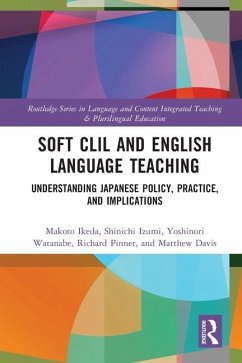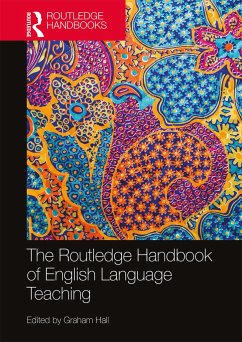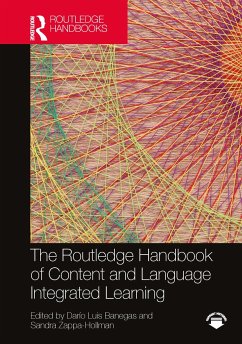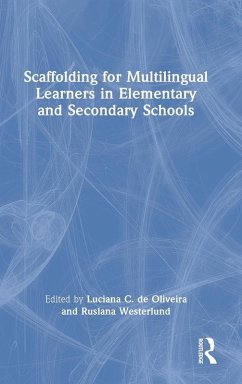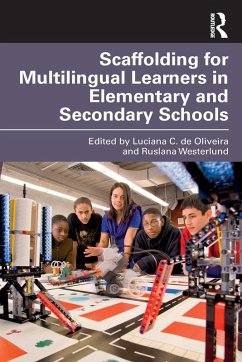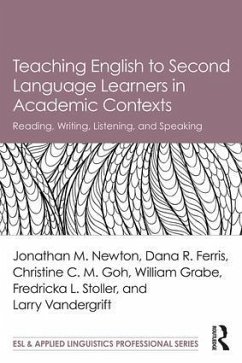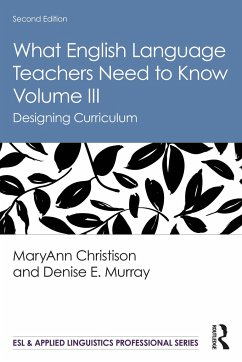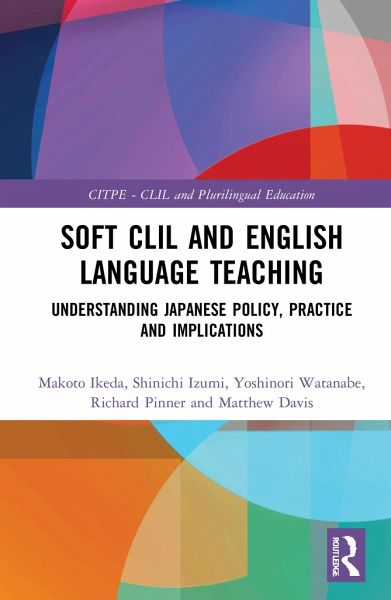
Makoto Ikeda (Japan Sophia University)Shinichi Izumi (Japan Sophia University)Yoshinori Watanabe (Japan Sophia University)
Gebundenes Buch
Soft CLIL and English Language Teaching
Understanding Japanese Policy, Practice and Implications
Versandkostenfrei!
Versandfertig in 1-2 Wochen

PAYBACK Punkte
84 °P sammeln!




Content and Language Integrated Learning (CLIL) is a transformative and powerful approach to language education. This volume fills the gap between CLIL and English Language Teaching (ELT) by examining the experiences of CLIL practitioners in Japan.
Makoto Ikeda is a professor in English Philology and English Language Education in the Department of English Literature at Sophia University. He received his MA in Applied Linguistics and English Language Teaching from King's College London and his PhD in English Philology from Sophia University. He has written various CLIL methodology books and articles for practitioners and researchers in Japan and delivered numerous invited lectures, seminars and workshops for Japanese, Asian and European audiences. His current research interests include the precise nature of integration in CLIL, particularly how grammatical and lexical items are unconsciously acquired while students are consciously engaged in content learning. Shinichi Izumi is a professor in the Department of English Studies at Sophia University, where he teaches in the BA programme in English Language Studies and the MA and the PhD programmes in Applied Linguistics and TESOL. He received his MA in Applied Linguistics from Southern Illinois University at Carbondale and his PhD in Applied Linguistics from Georgetown University. He has been involved in EFL teacher education throughout Japan and has published widely both nationally and internationally in areas related to instructed second/foreign language acquisition, in particular on topics related to Content-Based Instruction (CBI), Task-Based Instruction (TBI), Focus on form, and Content and Language Integrated Learning (CLIL). Yoshinori Watanabe is a professor of the Graduate School of Languages and Linguistics at Sophia University. He holds a PhD from Lancaster University, focusing his dissertation on the washback effect of Japanese university entrance examinations. He has a long-standing interest in language learning strategies, language assessment, and CLIL, and he has a number of publications in these areas, including 'Washback effects of college entrance examination on language learning strategies' (Bulletin of Japan Association of College English Teaching), Washback in Language Testing (with Liying Cheng, Routledge), and many others. His latest contributions include CLIL Volumes I, II, and III (co-authored, Sophia University Press), and 'Profiling lexical features of teacher talk in CLIL courses - The case of an EAP programme at higher education in Japan' (International CLIL Research Journal). He is currently President of Japan Language Testing Association. Richard Pinner is an Associate Professor in the Department of English Literature at Sophia University. He holds an MA in Applied Linguistics and ELT from King's College London and a PhD from The University of Warwick. He is the author of three books, as well as several articles which have appeared in international journals such as Language Teaching Research and Applied Linguistics Review. His research focuses on the dynamic relationship between authenticity and motivation in language teaching and learning. Matthew Davis is a teacher at Okayama Prefectural Okayama Daianji Secondary School, where he teaches English as a Foreign Language at both the lower and upper secondary level. While he holds an MA in English Language Education from Okayama University, his undergraduate background is in international affairs and Japanese. His involvement in implementing Soft CLIL at the secondary level began with attempts to improve classroom-based English debate tasks in 2013. While he continues to speak on, participate in, and promote English debate, his primary interest is on CLIL task design and observing student interaction in tasks.
Produktdetails
- Routledge Series in Language and Content Integrated Teaching & Plurilingual Education
- Verlag: Taylor & Francis Ltd
- Seitenzahl: 198
- Erscheinungstermin: 25. August 2021
- Englisch
- Abmessung: 240mm x 161mm x 15mm
- Gewicht: 440g
- ISBN-13: 9780367145637
- ISBN-10: 0367145634
- Artikelnr.: 62220234
Herstellerkennzeichnung
Libri GmbH
Europaallee 1
36244 Bad Hersfeld
gpsr@libri.de
Für dieses Produkt wurde noch keine Bewertung abgegeben. Wir würden uns sehr freuen, wenn du die erste Bewertung schreibst!
Eine Bewertung schreiben
Eine Bewertung schreiben
Andere Kunden interessierten sich für


